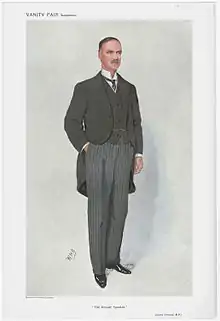Alfred Emmott, 1st Baron Emmott
Alfred Emmott, 1st Baron Emmott, GCMG, GBE, PC (8 May 1858 – 13 December 1926) was a British businessman and Liberal Party politician.
The Lord Emmott GCMG GBE PC | |
|---|---|
| Chairman of Ways and Means | |
| In office 1906–1911 | |
| Monarch | Edward VII George V |
| Preceded by | Sir John Grant Lawson, 1st Baronet |
| Succeeded by | John Henry Whitley |
| Under-Secretary of State for the Colonies | |
| In office 23 October 1911 – 6 August 1914 | |
| Monarch | George V |
| Prime Minister | H. H. Asquith |
| Preceded by | The Lord Lucas of Crudwell |
| Succeeded by | The Lord Islington |
| First Commissioner of Works | |
| In office 6 August 1914 – 25 May 1915 | |
| Monarch | George V |
| Prime Minister | H. H. Asquith |
| Preceded by | The Earl Beauchamp |
| Succeeded by | Lewis Vernon Harcourt |
| Personal details | |
| Born | 8 May 1858 |
| Died | 13 December 1926 (aged 68) London |
| Nationality | British |
| Political party | Liberal |
| Spouse(s) | Mary Lees |
| Alma mater | University of London |
Background and education
The eldest surviving son of Thomas Emmott, of Brookfield, Oldham, he was educated at Grove House, Tottenham, and at the University of London. He became a partner in Emmott and Walshall, cotton spinners, of Oldham.
Political career
In 1881, Emmott entered the Oldham Municipal Borough Council and was mayor of the town between 1891 and 1892. In a by-election in 1899 he was elected Liberal Member of Parliament for Oldham, a seat he held until 1911.[1] It was a two-member seat, and Winston Churchill, who started his political career there, was the other member from 1900 to 1906.[1]

As depicted in Vanity Fair, 19 October 1910
Emmott served as Chairman of Ways and Means (Deputy Speaker of the House of Commons) from 1906 to 1911 and was sworn of the Privy Council in 1908.[2] In October 1911 he was appointed Under-Secretary of State for the Colonies by H. H. Asquith and the following month he was raised to the peerage as Baron Emmott, of Oldham in the County Palatine of Lancaster.[3] He remained at the Colonial Office until 1914 and was then a member of Asquith's cabinet as First Commissioner of Works between 1914 and 1915.
Emmott was also Director of the War Trade Department between 1915 and 1919, chaired the Royal Commission on Decimal Coinage between 1918 and 1920 and was President of the Royal Statistical Society between 1922 and 1924. He was a churchman, but his education at the Friends' School and his ancestry led him to sympathize with nonconformists. He was appointed a GCMG in 1914 and a GBE in 1917.
In his approach to politics, Emmott was a strong supporter of the government's social reforms.[4] This was arguably reflected in 1910 when Emmott, in response to Conservative critics who attacked the Liberals as "socialistic", retorted that "so far as we have gone in the direction of Socialism, so-called, whether it be in regard to free and compulsory education, whether it be in regard to old age pensions, or in respect of any other reform, we have not diminished, but rather added to the liberty of the individual."[5]
Family
Lord Emmott married Mary Gertrude, a daughter of J. W. Lees, in 1887, and they had two daughters. Lady Emmott was a Justice of the Peace for London. In February 1926, aged 67, Lord Emmott died very suddenly, from angina pectoris, at his home in London, on a day when he was engaged to speak at a Liberal Party rally. The barony became extinct on his death, as he had no son.
| Parliament of the United Kingdom | ||
|---|---|---|
| Preceded by Robert Ascroft James Francis Oswald |
Member of Parliament for Oldham 1899–1911 With: Walter Runciman 1899–1900 Winston Churchill 1900–1906 John Albert Bright 1906–1910 William Barton 1910–1911 |
Succeeded by Edmund Bartley-Denniss William Barton |
| Preceded by Sir John Lawson, Bt |
Chairman of Ways and Means 1906–1911 |
Succeeded by John Henry Whitley |
| Political offices | ||
| Preceded by The Lord Lucas of Crudwell |
Under-Secretary of State for the Colonies 1911–1914 |
Succeeded by The Lord Islington |
| Preceded by The Earl Beauchamp |
First Commissioner of Works 1914–1915 |
Succeeded by Lewis Harcourt |
| Peerage of the United Kingdom | ||
| New creation | Baron Emmott 1911–1926 |
Extinct |
References
- Craig, F. W. S. (1989) [1974]. British parliamentary election results 1885–1918 (2nd ed.). Chichester: Parliamentary Research Services. ISBN 0-900178-27-2.
- leighrayment.com Privy Counsellors 1836-1914
- "No. 28547". The London Gazette. 3 November 1911. p. 7952.
- Heath, Alison (6 October 2015). The Life of George Ranken Askwith, 1861–1942. ISBN 9781317320043.
- Clarke, P. F. (26 March 2007). Lancashire and the New Liberalism. ISBN 9780521035576.
External links
| Wikimedia Commons has media related to Alfred Emmott, 1st Baron Emmott. |
- Hansard 1803–2005: contributions in Parliament by Alfred Emmott
.svg.png.webp)